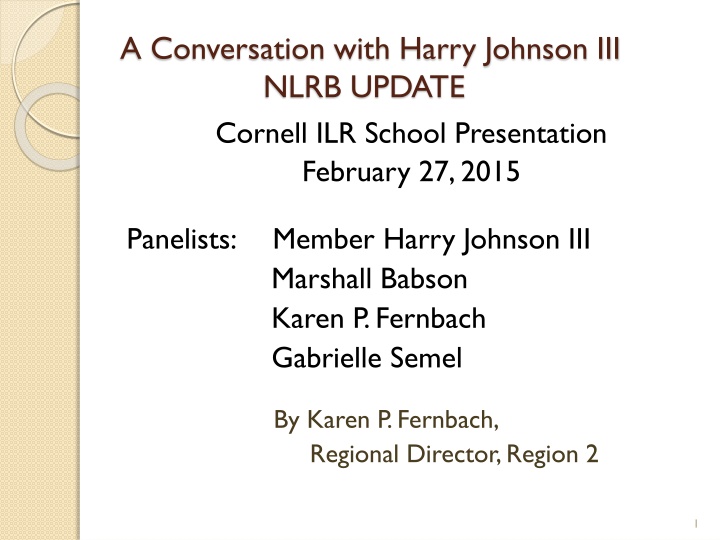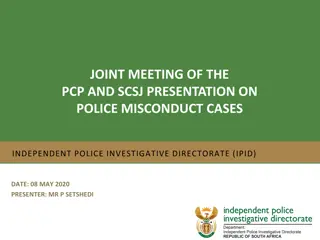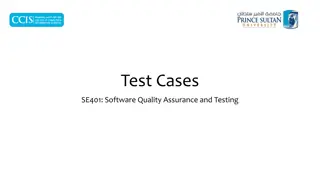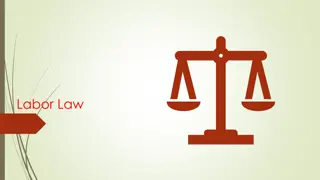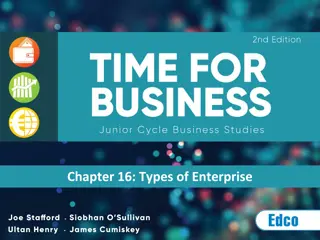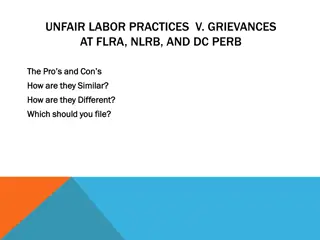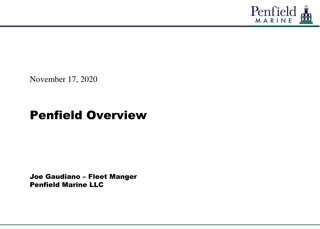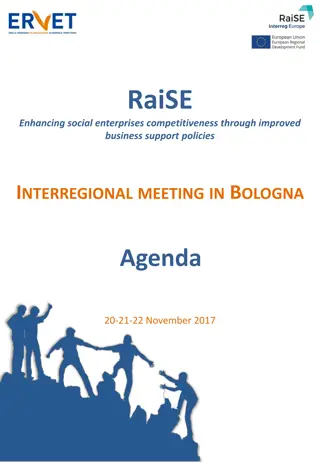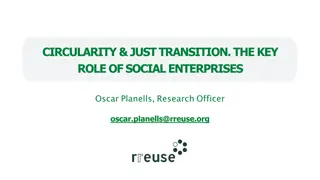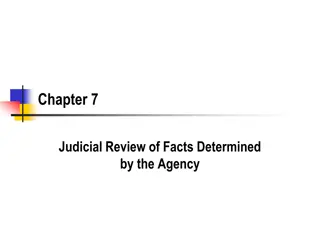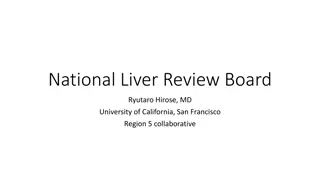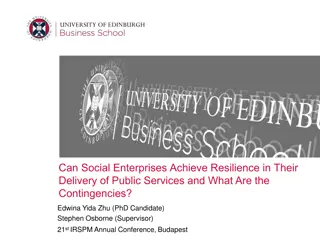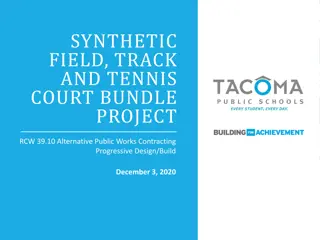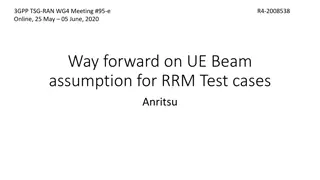NLRB Update: Cases of MikLin Enterprises, Inc. and Three D, LLC
The National Labor Relations Board (NLRB) addressed cases involving MikLin Enterprises, Inc., d/b/a Jimmy John's, and Three D, LLC d/b/a Triple Play Sports Bar and Grille. In the MikLin Enterprises case, the Board ruled on the protection of communication related to a labor dispute, while in the Three D, LLC case, the issue revolved around the discharge of employees due to a Facebook discussion on state income taxes. These cases highlight the NLRB's decisions on employee rights and employer actions in labor-related matters.
Download Presentation

Please find below an Image/Link to download the presentation.
The content on the website is provided AS IS for your information and personal use only. It may not be sold, licensed, or shared on other websites without obtaining consent from the author.If you encounter any issues during the download, it is possible that the publisher has removed the file from their server.
You are allowed to download the files provided on this website for personal or commercial use, subject to the condition that they are used lawfully. All files are the property of their respective owners.
The content on the website is provided AS IS for your information and personal use only. It may not be sold, licensed, or shared on other websites without obtaining consent from the author.
E N D
Presentation Transcript
A Conversation with Harry Johnson III NLRB UPDATE Cornell ILR School Presentation February 27, 2015 Panelists: Member Harry Johnson III Marshall Babson Karen P. Fernbach Gabrielle Semel By Karen P. Fernbach, Regional Director, Region 2 1
MikLin Enterprises, Inc., d/b/a Jimmy John s, 361 NLRB No 27 (8/21/14) Issue: Did a poster and press release about the employer s sick leave policy lose the protection of the Act because they were so disloyal, reckless or maliciously untrue under Jefferson Standard and MasTec? NLRB v. Electrical Workers Local 1229 (Jefferson Standard), 346 U.S. 464 (1953) and MasTec Advanced Technologies, 357 NLRB No. 17 (2011). 2
MikLin Enterprises, Inc., d/b/a Jimmy John s, 361 NLRB No 27 (8/21/14). Facts: Employer did not provide paid sick leave. Union developed posters that displayed a sandwich made by healthy worker and sick worker. The posters asked could you tell the difference and stated, We hope your immune system is ready because you are about to take the sandwich test . . . There was a press release that included the poster 3
MikLin Enterprises, Inc., d/b/a Jimmy John s, 361 NLRB No 27 (8/21/14) Majority of Board (Pearce and Schiffer) found the press release and posters did not lose the protection of the Act. 1. Communications were related to a labor dispute 2. Communications were not reckless or maliciously untrue 3. Communications were not so disloyal to lose the protections of the Act 5
MikLin Enterprises, Inc., d/b/a Jimmy John s, 361 NLRB No 27 (8/21/14) Board found that discharging 6 employees and disciplining 3 others for their involvement in the Union s Sick Days poster campaign violated Section 8(a(3). Member Johnson dissented and found that the Union s contaminated sandwich poster campaign purposefully disparaged MikLin Enterprises signature product in a manner that was out of all proportion to the alleged sick leave dispute. Id. at 10 6
Three D, LLC d/b/a Triple Play Sports Bar and Grille, 361 NLRB No. 31(8/22/14). Facebook Postings: Board (Miscimarra, Hirozawa and Schiffer) found that the Employer violated Section 8(a)(1) by discharging two employees for their participation in a Facebook discussion involving claims that employees unexpectedly owed additional state income taxes because of the Employer s withholding mistakes. 7
Three D, LLC d/b/a Triple Play Sports Bar and Grille, 361 NLRB No. 31(8/22/14). Facts: Former employee posted: Maybe someone should do the owners of Triple Play a favor and buy it from them. They can t even do tax withholding correctly!!! Now I OWE money . . .WTF!!! A current employee liked this posting. Another current employee posted: I owe too. Such an asshole. 8
Three D, LLC d/b/a Triple Play Sports Bar and Grille, 361 NLRB No. 31(8/22/14). The Employer discharges the one employee for her posting stating that she was not loyal enough to be working for the Employer. The Employer also questions the employee who had liked the initial posting and fired him because he liked what the Employer considered to be disparaging and defamatory comments. 9
Three D, LLC d/b/a Triple Play Sports Bar and Grille, 361 NLRB No. 31(8/22/14). The ALJ found, and the Respondent did not contest, that the two employees were engaged in protected concerted activity because the discussion concerned workplace complaints about tax liabilities. The issue was whether the discussion exceeded the protections of the Act. Board initially concludes that the Atlantic Steel framework does not apply because it is tailored to workplace confrontations. 10
Three D, LLC d/b/a Triple Play Sports Bar and Grille, 361 NLRB No. 31(8/22/14). The Board applied the Jefferson Standard and Linn tests: Did the employees conduct amount to disloyal disparagement of their employer so as to fall outside the protection of the Act or were the statements uttered with knowledge of its falsity, or with reckless disregard of whether it was true or false. 11
Three D, LLC d/b/a Triple Play Sports Bar and Grille, 361 NLRB No. 31(8/22/14). Board finds that comments at issue did not even mention, much less disparage the employer s products or services. The Board also found that the comments were not defamatory. The Board then found that the Employer violated Section 8(a) (l) by discharging the two employees because of their protected concerted activity. 12
Three D, LLC d/b/a Triple Play Sports Bar and Grille, 361 NLRB No. 31(8/22/14). Two members of the Board(Hirozawa, Schiffer) also found that the Internet Blogging Policy was unlawful: when internet blogging, chat room discussions, e-mail, text messages, or other forms of communication extend to employees revealing confidential and proprietary information about the Company, or engage in inappropriate discussions about the company, management and/or coworkers, the employee may be violating the law and is subject to disciplinary action, up to and including termination of employment. In the event state or federal law precludes this policy, then it is of no force and effect. 13
Three D, LLC d/b/a Triple Play Sports Bar and Grille, 361 NLRB No. 31(8/22/14). Majority conclude that rule was overbroad under Lutheran Heritage because employees would reasonably interpret the rule as proscribing discussion of terms and conditions of employment deemed inappropriate by the Employer. Majority notes that unlawful actions in this case indicated to employees that the savings clause did not protect them. 14
Three D, LLC d/b/a Triple Play Sports Bar and Grille, 361 NLRB No. 31(8/22/14). Member Miscimarra found policy to be lawful: Nobody can seriously disagree that the two listed infractions disclosing confidential and proprietary information and inappropriate discussions may violate one or more laws and be proper grounds for discipline. Id at 11. He accuses the majority of unfairly combining prongs one and three of Lutheran Heritage. He would also give effect to the savings language. 15
Pacific Lutheran University, 361 NLRB No. 157 (12/16/14). 3-2 decision by Board asserting jurisdiction over contingent faculty. Catholic Bishop Issue: If a college or university argues that the Board cannot assert jurisdiction over a unit of faculty members because the university is a religious one, the university must first show, as a threshold requirement, that First Amendment concerns are implicated by showing it holds itself out as providing a religious educational environment. 16
Pacific Lutheran University, 361 NLRB No. 157 (12/16/14). Once the threshold requirement is met, the university must show that it holds out the petitioned for contingent faculty members themselves as performing a specific role in creating or maintaining the college s or university s religious educational environment, as demonstrated by representations to current or potential students and faculty members, and the community at large. Majority finds the school meets threshold requirement but faculty aren t held out as part of religious educational environment. 17
Pacific Lutheran University, 361 NLRB No. 157 (12/16/14). Yeshiva Issue: Where a party asserts that university faculty are managerial employees, the Board will examine the faculty's participation in the following areas of decisionmaking: academic program, enrollment management, finances, academic policy and personnel policies and decision. The first three areas are considered to be primary and are given greater weight. 18
Pacific Lutheran University, 361 NLRB No. 157 (12/16/14). The Board will then determine, in the context of the university s decision making structure and the nature of the faculty s employment relationship with the university, whether faculty actually control or make effective recommendations over those areas. If they do, the Board will find that they are managerial employees and, therefore, excluded from the Act s protections. 19
Pacific Lutheran University, 361 NLRB No. 157 (12/16/14) Dissents by Members Johnson and Miscimarra: Member Johnson dissents finding Board s new standard that establishes a balancing test between First Amendment and NLRA raises constitutional avoidance concerns under Catholic Bishop. Great Falls Test (D.C. Cir. 2002) is the appropriate standard to apply. Under this test, the institution is exempt if it (a)holds itself out to students, faculty, community as a religious entity. (b) Is a non-profit institution (c) Is affiliated, owned, operated, or controlled by a religious organization, or with entity where membership is determined in part by religious identity 20
Pacific Lutheran University, 361 NLRB No. 157 (12/16/14) Member Johnson concludes that PLU is a religious entity that holds itself out to students, faculty and community as providing a religious educational environment, is a non-profit, and is affiliated with the Evangelical Lutheran Church in America Member Miscimarra concurs with Johnson in applying the D.C. Circuit Great Falls standard 21
Pacific Lutheran University, 361 NLRB No. 157 (12/16/14) --Yeshiva Issue Member Johnson also prefers a more flexible test than majority s evaluation of managerial status into primary or secondary criteria In particular Member Johnson would consider academic policy and personnel policy and decisions as possible primary indicia depending on the importance in a particular university and to their consumers. Member Miscimarra agrees generally with majority distinction between primary/secondary criteria but also argues for greater flexibility in applying the criteria. 22
Purple Communications, Inc., 361 NLRB No. 126 (12/11/14). Relying on a Republic Aviation analysis, the majority of the Board (Pearce, Hirozawa, Schiffer) will presume that employees who have rightful access to their employer s email system in the course of their work have the right to use the email system to engage in Section 7-protected communications on nonworking time. An employer may rebut the presumption by demonstrating special circumstances necessary to maintain production or discipline that justify restricting its employees rights. 23
Purple Communications, Inc., 361 NLRB No. 126 (12/11/14). Because limitations on employee communication should be no more restrictive than necessary to protect the employer s interests, the Board anticipated that it will be a rare case where the special circumstances will justify a total ban on non- work email use by employees. However, an employer may apply uniform and consistently enforced controls over their email system to the extent necessary to maintain production and discipline. 24
Purple Communications, Inc., 361 NLRB No. 126 (12/11/14). The decision addresses only email systems and not any other electronic communications. The decision encompasses email use by employees only and does not grant non- employees any rights to access the employer s emails system. The decision does not require an employer to grant employees access to its email system where it has not chosen to do so. The presumption in this decision is expressly limited to non-working time. 25
Purple Communications, 361 NLRB No. 126 (12/11/14) Member Johnson dissented arguing that Republic Aviation is not the appropriate framework to permit employee use of e-mail system. Use of e-mail to communicate with co-workers is not same as the water cooler. New rule impermissibly undermines right to own and operate an e-mail network for business purposes. Employees have other ways to communicate with social networking e-mail sites, smart phones, text messaging. 26
Purple Communications, Inc. 361 NLRB No. 126 (12/11/14) Member Miscimarra dissented, arguing that majority standard fails to appropriately balance NLRA-Protected Rights and Employer Property Rights. Employees have access to electronic communications through Facebook, text messaging, twitter and other social media services 27
Babcock & Wilcox Construction Co., 361 NLRB No. 132 (12/15/14). A majority of the Board (Pearce, Hirozawa, Schiffer) modified the Boards deferral standard for deferral to arbitration awards. If the arbitration procedures are fair and regular and if the parties agreed to be bound, the Board will defer to an arbitral decision if the party urging deferral shows that: (1) the arbitrator was explicitly authorized to decide the unfair labor practice issue; 28
Babcock & Wilcox Construction Co., 361 NLRB No. 132 (12/15/14). (2) the arbitrator was presented with and considered the statutory issue, or was prevented from doing so by the party opposing deferral; and (3) Board law reasonably permits the award. Note: As to item (1), the proponent for deferral can demonstrate that the specific statutory right at issue was incorporated into the collective-bargaining agreement or that the parties explicitly authorized the arbitrator to decide the statutory issue. 29
Babcock & Wilcox Construction Co., 361 NLRB No. 132 (12/15/14). As to item (2), the Board stated, We shall find that the arbitrator considered the statutory issue when the arbitrator has identified that issue and at least generally explained why he or she finds that the facts presented either do or do not support the unfair labor practice allegation. Id. at 7. 30
Babcock & Wilcox Construction Co., 361 NLRB No. 132 (12/15/14). As to item (3), the Board stated: that the arbitrator s decision must constitute a reasonable application of the statutory principles that would govern the Board s decision if these facts were presented to the Board. However, the arbitrator need not reach the same result as the Board. It must only be a result that a decision maker reasonably applying the Act would make. 31
Babcock & Wilcox Construction Co., 361 NLRB No. 132 (12/15/14). The Board further concluded that it was appropriate to apply the same deferral principles to prearbitral settlement agreements. The Board decided to apply the new standard prospectively only. The Board noted: [W]here current contracts do not authorize arbitrators to decide unfair labor practice issues, we will not apply the new standards until those contracts have expired, or the parties have agreed to present particular statutory issues to the arbitrator. Id. at 14. 32
Babcock & Wilcox Construction Co., 361 NLRB No. 132 (12/15/14) Member Miscimarra in dissent argues that new deferral policy prohibited by 10(c) which prevents reinstatement and backpay if just cause for discharge even if Board determines a statutory violation overrides employer s just cause defense. (Member Johnson will cover his dissent in toto.) 33
General Counsel Guidance Memo on Babcock & Wilcox GC Memorandum 15-02, Guideline Memorandum Concerning Deferral to Arbitral Awards, the Arbitral Process, and Grievance Settlements in Section 8(a)(1) and (3) cases, dated February 10, 2015. Provides guideline memo to the Regions and the parties. Memo is on www.nlrb.gov Link to memo is provided on Labor and Employment Law website. 34
HIJ Points (MikLin) Agreement on most of the case Core disagreement: What does reckless disregard or disloyalty mean? Can workers say shoot, we can t even call in sick if they can call in sick (with a replacement for the shift)? Can the poster tell consumers their immune system is about to be tested without it being construed as an allegation of contamination? See also, press release: As flu season continues, the sandwichmakers are sick and tired of putting their health and the health of their customers at risk. Can the poster be created with no evidence of foreknowledge of MikLin s health record? 35
HIJ Points (MikLin) Can the poster fail even the most basic notions of statistical proof or empirical analysis and still be true enough or loyal ? Two cases of foodborne disease in 10 years (latest was 4 years before poster) and 6 million sandwiches. ALJ: no direct correlation established between these incidents and the absence of sick leave. ALJ: one could regard the risk of becoming ill by eating at one of Respondent s shops to be infinitesimal. Proportionality: Enmeshing every other franchisee and JJ s itself. 36
HIJ Points (Triple Play) Statements in a labor dispute that are reasonably tied into some element of truth are not reckless disregard and don t lose their protection. No question that Employer caused the employees to come up short in their tax payments Statements that are mere name-calling (i.e. opinion) are not disloyalty Note that Board did acknowledge employer interest versus disparagement . 37
HIJ Points (Purple: General) Atypical employer email policy. The majority could have gone many different ways without overturning so much. E.g., mixed use distribution case rationale. Proper focus: adequate avenues for effective employee Sec.7 communication. No parallel basis for importing physical space Republic Aviation presumption here. Minimizes alternative technologies. Effectively ignores First Amendment. 38
HIJ Points (Purple: Water Cooler or Something Else?) 39
HIJ Points (PLU: First Amendment) Big picture: The Board s silo approach can run afoul of the Constitution and other statutes. My limited praise for specifically religious test: Ostensibly doesn t test depth of belief but a faculty role is not specifically religious, unless it is either pure proselytization or uniqueto the religion. Really? Decision actually fairly easy to comply with, if religious schools exercise some forethought. 42
HIJ Points (PLU: Managerial) 5-0 agreement on result; agreement on general approach and most of factors Difference lies in steepness of burden of proof re: effective recommendation Majority (p. 18): To be effective, recommendations must almost always be followed by the administration . ; Further, faculty recommendations are effective if they routinely become operative without independent review by the administration. Burden is too steep where exemption defeated by (a) failure to almost always follow faculty recommendation or (b) by any administration review. 43
HIJ Points (PLU: Managerial) To underscore the analytical flaw here: Would these individuals be managerial? .e.g., are their policy positions almost always followed and also never independently reviewed? The President of the United States A United States Senator The officers of any company (besides perhaps the CEO) HR officials 44
HIJ Points (Babcock) What consequences are now apparent that require changing the deferral standard under Spielberg-Olin in effect for over 30 years? New standard permits a Board de novo review; doesn t accommodate the parties collectively- bargained dispute resolution agreements. New test is contrary to Federal Arbitration Act. Two bites of the apple delays parties final resolution of disputes and provides a one-sided advantage to one type of contracting party only. Disastrous effects on settlements of grievances by laypersons. 45
